It’s no secret that industrial agriculture is wreaking havoc on our planet. But, in a world of seven billion people, can alternative growing strategies really feed everyone?
In truth, sustainable agriculture is the ONLY option for adequately feeding the world. While conventional strategies steal fertility from the future by relying on synthetic fertilizers and pesticides at the expense of soil health, organic methods leave the earth better after every season.
There are thousands of people working hard to promote alternative agricultural techniques around the world today, and together they are slowly changing the conversation around food.
And while it’s impossible to even come close to celebrating all of the people who are working so hard to make a difference in this area, we’re getting the conversation started by celebrating 14 individuals who are transforming how we all get our food — educating others about how we can eat well and still leave the planet healthier in the process.
We hope these individuals will inspire YOU to find NEW WAYS to improve the sustainability of your own diet. (And we hope you’ll mention some of the thousands of other deserving, changemaking men and women in your comments below!)
Listed in no particular order:
#1 – Howard Garrett
Radio Show Host, “The Dirt Doctor”
As one of the legends of organic gardening, Howard Garrett (the ‘Dirt Doctor’) has long been a leader in the movement in the United States. Throughout his career, Howard has worked in greenhouses, as a landscape contractor, golf course planner and organic product developer, and he is the chairman of the Texas Organic Research Center (TORC).
Born in Pittsburgh, Texas, Howard served in the Marines from 1970 to 1977 after graduating from Texas Tech University. The birth of his daughter in 1985 was a turning point in Howard’s life, and concerns about the world she was going to grow up in caused him to commit his career to the education, research, and the promotion of organic gardening practices.
Howard is the author of over a dozen books based on gardening, lawn care and natural wellness for the planet, including Marjory Wildcraft’s personal favorite, Bugs: The Good, The Bad, and The Ugly.
Today, Howard hosts the Organic Gardening Show as the Dirt Doctor, a nationally-syndicated radio show that airs each weekend on the Salem Radio Network. You can learn from Howard Garrett by checking out his radio show live from 8 to 11 am CST on Sundays, or by listening to his weekly radio show as a podcast through the Dirt Doctor App.
#2 – Joel Salatin
Sustainable Grass Farmer Extraordinaire
As the persona behind Polyface Farms, Joel Salatin needs little introduction in the world of natural farming. Salatin got his start in agriculture when his parents moved to an abused, worn-out farm in the Shenandoah Valley. As a family, they began to heal the landscape and restore fertility through innovative farming techniques that relied on nature as a guide.
Today, Salatin still farms that same plot of land and continues to improve it by planting trees, digging ponds, and building fertility through compost piles. He is famous for his rotational grazing strategies that move animals around his property through portable electric fences, and his ‘pastured poultry’ strategies for producing meat that’s raised entirely on his property’s fertility. For this reason, Joel considers himself first to be a grass farmer, as a healthy prairie system is a key to the functioning of every aspect of his farm.
Today, Polyface feeds hundreds of people and is considered to be a premier non-industrial production oasis. Beyond working his farm, Joel seeks to educate the world about the benefits of natural farming through numerous books and a lecture series that takes him throughout the country. In this way, Salatin works endlessly to make environmentally- friendly agricultural practices more accessible to people everywhere.
#3 – Hank Will
Molecular Geneticist turned Magazine Editor
From molecular geneticist to editor for eight national magazines, Hank Will’s career path has hardly been typical. Forever in love with the prairies of the Midwest, Hank became a professor of molecular genetics while still dabbling in the world of heritage livestock and unconventional farming as much as he could. His parent’s seed company was a major inspiration throughout his life and was the primary reason why he studied genetics in school.
After two decades as a professor, Hank transitioned his career and became a freelance journalist while working at his home farm, Cottonwood Creek Farms. His farm experience has allowed him to be an educational voice for small-scale, sustainable agriculture around the world. Today, he is the Editor in Chief of Mother Earth News Magazine and Heirloom Gardener Magazine, as well as the editorial director for all other brands from Ogden Publishing.
Hank’s personal farming experience spans more than four decades and is predominately focused on small-scale, high-cash flow operations, as well as maintaining perennial plants and raising heritage chickens. Today, he has written multiple books about natural farming while living in Kansas with his wife at their home on Prairie Turnip Farm.
#4 – John Dromgoole
Organic Gardening Radio Talk Show Host
His south Texas roots might account for John Dromgoole’s passion for southwest plants, but John has kept his passion for organic agriculture alive for over three decades. He is the host of America’s longest running organic gardening radio talk show (Gardening Naturally with John Dromgoole) and was the host of the first natural gardening series on PBS, called “The New Garden.”
John is also the owner of The Natural Gardener, an award-winning organic garden center in Austin, TX that is considered one of the top five garden centers in the United States. His main passion is finding better ways to bring professional and novice gardeners alike information about organic gardening techniques and resources so that they can personally experience how easy and beneficial following sustainable practices can be. Dwelling in the desert southwest, John is primarily concerned with the increasing scarcity of water resources and focuses his efforts on educating gardeners on water conservation efforts.
Thanks to his work for the organic farming movement, John has won local, state and regional awards, including the “Texas Legendary Promotor of Organics.”
#5 – Roger Doiron
Replanter of the White House Garden
Considered to be one of the “10 Most Inspiring People in Local Food”, Roger Doiron has made a significant impact on the planet in surprising ways — including through starting the campaign to replant the kitchen garden at the White House. Most notable, Roger is the founder and director of Kitchen Gardeners International, a nonprofit based in Maine that today includes over 35,000 individuals from 120 countries who are making a conscious effort to grow their own food at home.
Roger is also a freelance food and gardening writer, and his efforts to promote local, slow food has been featured in numerous news sources, including the New York Times, the Washington Post, Mother Earth News Magazine and more.
By combining his passion for supporting his own local food system and the state of slow food at large, Roger has helped bring the issues of sustainable food to the global stage — one kitchen garden at a time.
#6 – Dan Bussey
Seed Savers Exchange’s Heirloom Apple Enthusiast
As a longtime apple lover, perhaps only Johnny Appleseed has more passion for this classic fall fruit than Dan Bussey. Dan is the author of a 7-volume set titled The Illustrated History of Apples in North America, which is an encyclopedia collection that documents all 17,000 apple varieties that have grown in America between 1623 and 2000, making it the most complete collection of its kind.
Currently, Dan works as the orchard manager for the Seed Savers Exchange’s Heritage Orchard in Iowa. There, he tends to over 1,100 apple trees to preserve rare varieties so that they can be propagated and sold to customers of the exchange.
Founded in Missouri in 1975, Seed Savers Exchange started with two heirloom seed varieties from Bavaria and has since expanded to include over 20,000 plant varieties and 13,000 members. Almost every variety of apple is included in the Exchange’s collection, and if you choose to plant an heirloom apple tree, you might have Dan Bussey to thank.
#7 – John Jeavons
Grow More Food With Less Water,
While Boosting Soil Fertility
As the Executive Director of the global non-profit Ecology Action, John Jeavons has long been a leader in the field of bio-intensive agriculture. His passion for developing small-scale, high-yield farming systems led to the development of the GROW BIOINTENSIVE Sustainable Mini-Farming method, which is an approach to farming that allows small farmers to increase their yields while using two-thirds less water and building up their soil fertility up 60 times faster than nature can manage. This technique has been used for over four decades and has been successfully implemented in almost every climate system of the world, including 143 different countries.
John has also authored a book about his techniques, titled How to Grow More Vegetables and Fruits, Nuts, Berries, Grains and Other Crops Than You Ever Thought Possible on Less Land Than You Can Imagine. Now translated into eight languages, this book is considered the primer on sustainable mini-farming.
#8 – Paul Gautschi
Back to Eden Soil Star
Known throughout northern Washington as a master arborist, Paul Gautschi has been puttering in his backyard soil for over 55 years. Though he rarely raises food to sell, Paul has been feeding friends and his seven children off his garden for decades. Over the years, he has also given tours of his orchards and gardens to groups that sometimes range to over 400 people.
When Paul first moved to Washinton, he struggled to make plants grow in the heavy clay soil. However, he slowly started modifying his techniques to mimic the ways plants grow in the natural world with much more success.
This achievement made Paul the star in the popular film Back to Eden, which has been viewed online over 50 million times. The film shares Paul’s lifelong journey as a gardener, his relationship with God, and the simple, sustainable growing methods he incorporates into his garden to achieve impressive results. Through this film, you can gain inspiration from the life of a man who has devoted himself to organic growing and better understand what you can do to your own garden to increase yields simply and sustainably.
#9 – Ron Finley
Los Angeles’s ‘Gangsta Gardener’
A lifelong South Los Angeles resident, Ron Finley knew firsthand what the consequences of living in a food desert were when he set out to make a change for his community. Today, Ron is working to create urban food forests that can provide food to urban residents.
In 2010, Ron planted a small garden in a dirt strip near his home and started giving away the produce it delivered to his neighbors. Despite the value he was adding to the neighborhood food system, Ron was cited by the City of Los Angeles for illegally using the city’s property. Rather than let the government shut down his garden, Ron fought back with other green activists and demanded the right to grow food in his neighborhood. The city eventually backed off, and Ron has been expanding his operation to the surrounding communities ever since.
Thanks to his popular TED talk, Ron’s mission gained mainstream attention, and today he is supported by a team that knows him as the ‘Gangsta Gardener.’ Together, they are working to turn Los Angeles into a place where communities come together to create gardens and kids can grow up with more options for healthy food, sustainably grown food.
#10 – Justin Rohner
Founder, Agriscaping Technologies
If Justin Rohner has his way, every family will be able to step outside into a beautiful, easy-to-maintain yard and harvest dinner from “edible, elegant landscaping.” Rohner has dubbed this new perspective on landscaping “agriscaping,” defined as “what you get when you bring together the best of ornamental landscaping and the best of productive agriculture.”
The co-founder and CEO of Agriscaping Technologies, Rohner works with homeowners to help them discover their yards’ microclimates, choose the right plant for the right place, determine how much space they’ll need to cultivate to feed their families, and evaluate their properties’ water-harvesting potential. Clients who want further help can hire the company to create and maintain a beautiful, food-producing landscape.
A believer in using the power of technology to advance the synergistic principles of self-reliance and sustainable food, Rohner is leading the development of MyAgriscapePro, a mobile app that will serve as a virtual mentor for those interested in DIYing an edible landscape in their own backyards.
In addition to his work with Agriscaping, Rohner is a founding partner of Astonishing Families International and has created several other products and programs. In 2014, he was named one of Arizona’s Top 35 Entrepreneurs Under 35.
#11 – Allan Savory
Rotational Grazing Pioneer
Born in Zimbabwe, Allan Savory has long held a passion for managing ecosystems. He studied botany and zoology in South Africa and pursued a career as a research biologist. In the 1960s, Allan had a breakthrough about the cause of deforestation around the globe when he realized how important grazing animals were for preserving the African Savannahs. These observations led him to the conclusion that rotationally graving cattle on degraded land could improve grasslands and keep desertification at bay while promoting a more sustainable food source than tilling up soil to plant crops.
In 2003, he was the recipient of Australia’s International Banksia Award “for the person or organization doing the most for the environment on a global scale.” A TED talk he gave in 2013 has since gotten over 3.4 million views, earning it recognition as one of the top fifty most intriguing TED talks of all time.
Though his views on increasing cattle around the globe have been controversial, Allan Savory’s organization continues to promote the idea that bunching and moving livestock in ways that mimic nature is good for the environment. Savory’s book, Holistic Management: A New Framework for Decision-Making is a record to his effort to find ways for regular people to find the means to combat the ecological damage of the modern age by implementing strategies that mimic how nature naturally works.
#12 – Maheswar Khillar
Rooftop Gardener Inspiring His Indian Neighborhood
Mahesward Khillar is a retired OAS officer in India who is making rooftop gardening trendy in his community. His love of homegrown vegetables inspired him to start producing his own, despite severe space limitations. He has maintained his impressively diverse rooftop garden for the past 25 years and has inspired others around him to do the same.
Though Mahesward has been interested in plants since he was a kid, his house in Bhubaneswar had no space for anything but potted plants on the roof. Not one to back away from a challenge, he gradually began experimenting with putting different plants and fruit trees on the rooftop. Now, his collection has taken over the entire roof and takes him roughly three hours each day to maintain. The produce he grows regularly winds up in the meals that his wife cooks and the excess is often given to local friends that appreciate the ability to eat food that hasn’t been tainted with synthetic chemicals.
Now, roughly 300 other families in the region have been inspired enough by Mahesward’s rooftop garden to start their own, making him the leader of a gardening movement in his community that shows no sign of slowing down.
#13 – Echo International
Development Hub for Sustainable Agriculture
For the world’s most at risk-farming communities, surviving the crisis of climate change will come down to cultivating robust seed varieties, utilizing appropriate technology, and having the knowledge to implement it- three missions that ECHO has taken to heart for decades.
ECHO is an information hub for development practitioners that strives to find agricultural solutions to feed the world’s most vulnerable populations. ECHO maintains a demonstration farm in southern Florida as well as retreats for development organizers and an annual conference on sustainable farming for impoverished communities.
The organization began in the early 1970s when Indiana businessman Richard Dugger took a group of high school students to Haiti and saw firsthand how difficult farming could be for people in developing countries. ECHO (Educational Concerns for Haiti Organization) was formed to address the problem, and since then ECHO has grown its involvement to include countries throughout Central America, Africa, and Asia.
Today, the organization operates as an experimental farm for low-tech agricultural solutions and as a pipeline for sharing information, ideas, methods, techniques and even seeds that have potential to lessen the impacts of world hunger.
#14 – Bioversity International
Supporting Farmers In Developing Countries
Bioversity International is a global research and development organization that strives to support smallholder farmers in developing countries. The organization provides resources for sustainable agriculture techniques that improve harvests while promoting resource conservation around the planet.
By partnering with low-income countries, the organization is working from the soil up to improve agricultural sustainability and global food security for the world’s most vulnerable populations. The organization works to deliver scientific evidence and policy options that fit the unique conditions of each community to ensure that farmers have the resources they need to make improvements that increase their yields and profit margins.
In this way, Bioversity farmers are taught techniques for harvesting and using rainwater, creating on-farm fertility and rotational grazing techniques that enhance pastureland. The program specifically works to improve the range of appropriate technology options in regions where large-scale agriculture isn’t possible.
(This article was originally published September 11, 2017.)

The Grow Network is a global network of people who produce their own food and medicine. We’re the coolest bunch of backyard researchers on Earth! We’re constantly sharing, discovering, and working together to test new paths for sustainable living—while reconnecting with the “old ways” that are slipping away in our modern world. We value soil, water, sunlight, simplicity, sustainability, usefulness, and freedom. We strive to produce, prepare, and preserve our own food and medicine, and we hope you do, too!
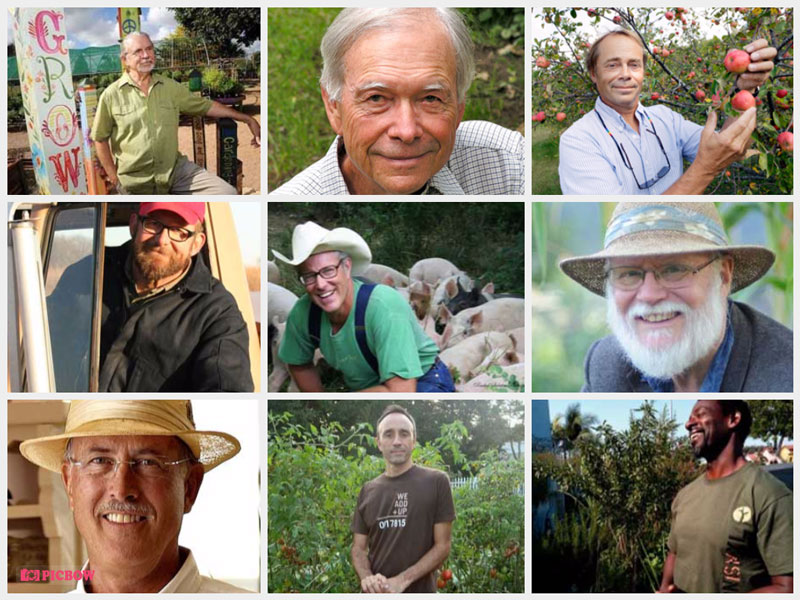
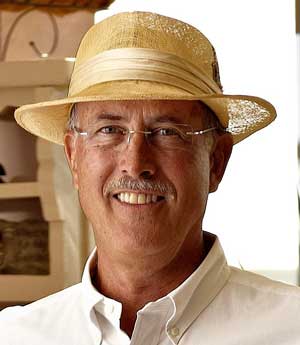
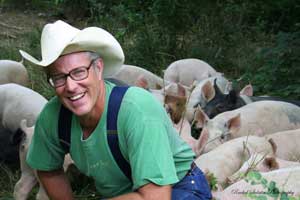
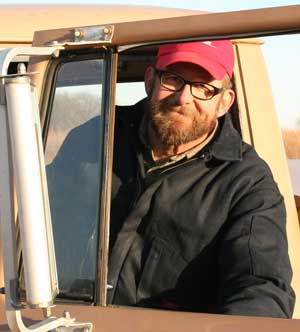
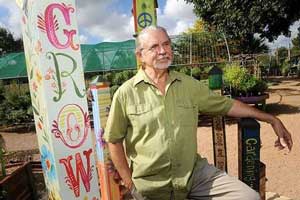
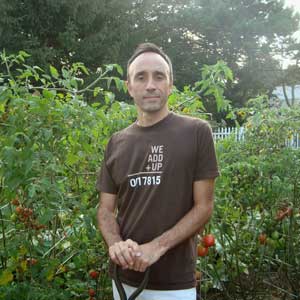
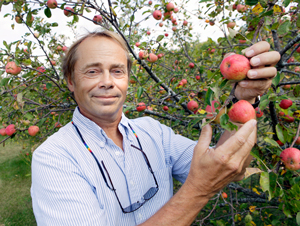
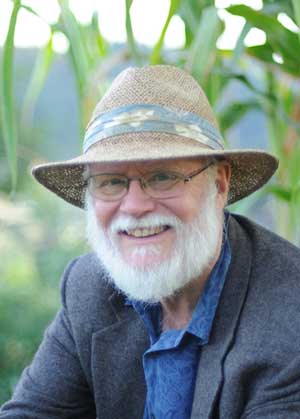
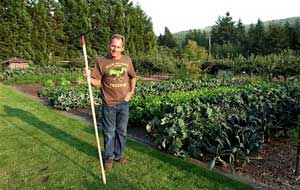
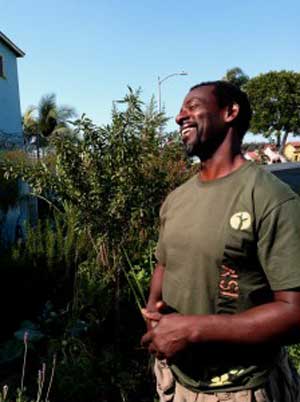
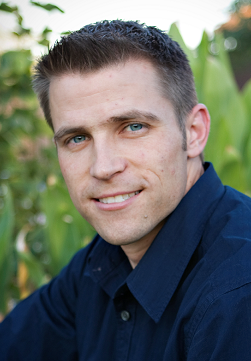
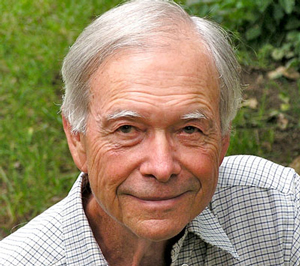
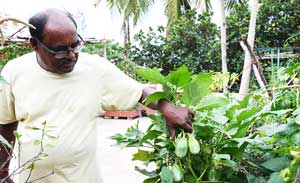
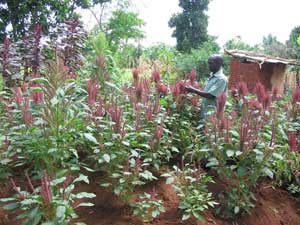
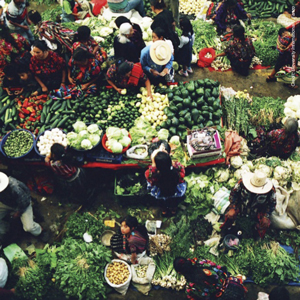







COMMENTS(14)
Thank you very much for the information so valuable
My friends,
Though men are required to labor in the garden so are women. I see none above.
Please see that the women do their work also, and, that it be given priority in display, as, men just don’t have some things and never will. Just like women don’t get some things.
This is the worst oversight I have seen in decades. Maybe half a century.
I look forward to Chapter 2 in this epic adventure when the women stake their claim to fame, fortune and flavor.
By the way, I’m a guy.
Moriyah
Absolutely, Moriyah! This is just the start and you will see many more faces of race and gender based on customer submissions in future chapters! Thank you for your thoughts!
thank you all.
Wow, most of these people are white men. While I appreciate all of the work they have done in sustainable farming, I know there are women and people of color who also do great things, and I would love to see them spotlighted alongside these white men!
I love the generosity and one-ness of this site and the wonderful “sharers” of help.
Self sufficiency sounds ideal but without expertise it could be a famine.
While I don’t dispute that these guys are doing some great stuff, I find it awfully hard to believe that there are no major female contributors to the field??? How you frame this stuff matters. Please do better.
We certainly appreciate the feedback, Emily! Not to worry, this is just the start and there are many others to come…of varied gender and race. Thank you for sharing! 🙂
It is a wonderful privilege to learn from these thirteen individuals, regardless of race, gender or religious affiliation. They deserve recognition. I have gardened for over 30 years and have utilized techniques from several of the individuals spotlighted. Many of their books line my shelves. I’m looking forward to the next article. Thank you for all your hard work and dedication.
Love it, Lindy!! These individuals definitely have great written publications! Thank you for sharing. 🙂
Great article on people inspiring us in the world
I would like to share with you another world change maker that I am working with changing the way we do agriculture even in the most averse conditions. Ernst Gotsch is teaching syntropic agriculture, see a brief overview on you tube life in syntropy, an agroforestry of abundant food production and tree production. This is a food forestry model adapted for large scale agriculture. It is truly abundant.
Interesting and informative article. To me anyone who gardens whether in a garden or even containers is making this a better world.
Great spotlight on productive people !
You may enjoy checking out “Our EcoVillage” on Vancouver Island, a living/growing/teaching group on lovely property with natural-built buildings. Spent 2 months there a few years ago, OUR has lots to share with the world.
https://ourecovillage.org